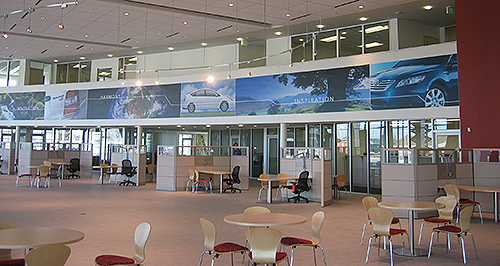News - Industry NewsUS government deems auto sales ‘essential service’Advisory: CISA director Christopher Krebs (left) is reminding people the essential service lists are only advisory, with the final decision to be left to state and local official officials. Dealer groups get their wish as auto sales deemed essential by US government21 Apr 2020 AFTER weeks of lobbying by some of America’s biggest automotive industry bodies and dealer groups, the Trump administration has deemed vehicle sales an essential service as the coronavirus pandemic continues to spread across the US.
The announcement came on Friday when the Cybersecurity and Infrastructure Security Agency (CISA) released the third version of its Essential Critical Infrastructure Workers guidance document “to help state and local jurisdictions and the private sector identify and manage their essential workforce while responding to COVID-19”.
Lobbying began on March 16 when the first version of the document was released but only listed automotive maintenance and repair locations as essential services, with no mention of sales operations.
Subsequently, the National Automobile Dealers Association, Alliance for Automotive Innovation, National Association of Minority Automobile Dealers, American International Automobile Dealers Association and American Truck Dealers were all signatories to a letter sent to the White House, urging President Trump to clarify the situation.
The alliance sought to ascertain that “certain sales and leasing activities at franchised new-car and new-truck dealers are essential services that need to be maintained during the COVID-19 pandemic, provided these limited activities are conducted in a manner that protects the general public, our customers and our employees”.
The letter also said: “We request that the previously issued Guidance by the DHS and CISA be amended to include – and that any future executive order issued by you include – the sale of light-, medium- and heavy-duty vehicles by dealers as an ‘essential service’ that should be permitted during the crisis, provided that the sales are conducted in a safe and sanitary manner that protects the health and safety of the general public and our members’ customers and employees.”
As a result, CISA has now expanded the list of essential services under the Transportation Systems Sector to include “workers critical to the manufacturing, distribution, sales, rental, leasing, repair and maintenance of vehicles and other transportation equipment (including electric vehicle charging stations) and the supply chains that enable these operations to facilitate continuity of travel-related operations for essential workers”.
It also covers workers involved in “automotive repair, maintenance and transportation equipment manufacturing and distribution facilities (including those who repair and maintain electric vehicle charging stations)”.
According to CISA director Christopher Krebs, Version 3.0 of the guidance clarifies and expands critical infrastructure workers in several categories – not just transport sector – and provides additional information as considerations for both government and business.
“CISA continues to work with our partners in the critical infrastructure community to understand what’s needed to keep essential functions and services up and running,” he said.
While this is undoubtedly a win for the car industry, the amendment is only a recommendation from the Trump administration as opposed to a federal directive, with the final decision to be left up to state and local government authorities.
This fact has been reiterated several times over by CISA with all three versions of the document containing a bolded foreword emphasising the advisory nature of its publication.
“Individual jurisdictions should add or subtract essential workforce categories based on their own requirements and discretion,” CISA said.
Mr Krebs also said that although states and local jurisdictions did not legally have to adhere to the list, many had used it as a reference point.
“At this point, at least 33 states and numerous local jurisdictions have used the guidance in some way, so we’re encouraged that a common national approach is emerging and will continue to make refinements in response to our partners’ requirements,” he said.
According to a report published yesterday (April 20) by Carbuzz, 24 of the 50 US states were allowing dealerships to remain open while a further 23 have permitted online sales only.
Up until recently, just four states had banned all forms of automotive sales – Michigan, Hawaii, Pennsylvania and Kentucky. Earlier this month, Michigan relaxed its regulations to allow online sales.
In Australia, dealerships have not been required to close under federal or state and territory regulations but many have done so – particularly their showrooms – due to significantly reduced business operations as citizens heed the call to stay at home.
As reported, New Zealand has been in full lockdown as part of prime minister Jacinda Ardern’s ‘Alert Level 4 – Eliminate’ strategy, which has seen all dealerships close unless opening up their workshops to specifically attend to a vehicle deemed ‘essential’ to fighting the coronavirus epidemic.
This lockdown was introduced on March 25, and will be eased back to an ‘Alert Level 3’ as of April 28 that will allow dealerships to reopen under carefully managed new conditions.  Read more |
Click to shareIndustry News articlesMotor industry news |

















Facebook Twitter Instagram